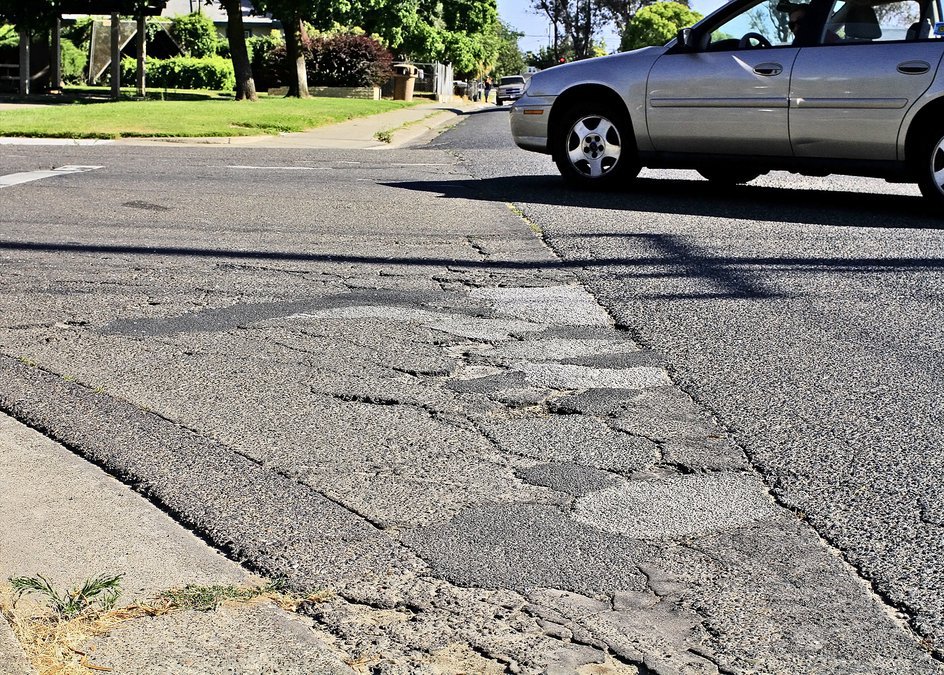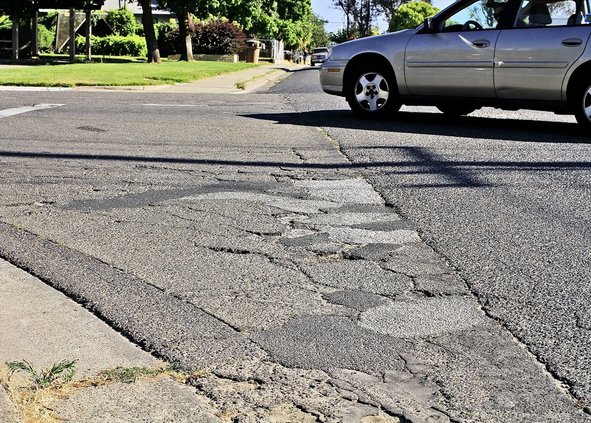The jarring ride one experiences today driving over the cracking streets of the Springtime Estates neighborhood will not only be smoother by year’s end but quieter.
That’s because the $2.5 million project to essentially rebuild streets within the triangle created by Louise Avenue on the south, Highway 99 on the east and the commercial property facing North Main Street will include recycled crushed tires in the asphalt mix.
The asphalt/tire mix is being made possible by a $350,000 Cal Recycle grant. The project to repave Springtime Estates along with Mayors Park in the triangle bounded by Louise Avenue on the north, Union Road on the east and the railroad tracks on the west is before the City Council when they convene Tuesday at 7 p.m. during a Zoom meeting. The council meeting can be viewed via livestreaming on the city’s website or on Comcast Channel 97.
The city has applied the crushed rubber pavement mix in the past to resurface city streets.
The first streets to go with the rubber chip seal mixture was in 2008. They were a half mile section of Cottage between Yosemite Avenue and the Highway 99 overcrossing, about a half mile of Center Street between the Union Pacific Railroad crossing and Union Road, as well as Industrial Park Drive between Bessemer and Main Street.
Then in 2010 portions of Union Road, Alameda Street, North Street, Mission Ridge Drive, Wawona Street, Winters Drive, Hoyt Lane, Northgate Drive and Button Avenue were surfaced with the mixture
The use of the mixture of recycled tires and has a life just as long – if not longer – than asphalt. It also costs less if the city secures the grant for the use of tires in the resurfacing material.
Studies have shown the 20 percent tire rubber mixture combined with liquid asphalt also is reducing vehicle noise by as much as four decibels. Research cited by the Arizona Department of Transportation shows reduction in noise levels of 50 to 75% is commonly attained.
Arizona transportation officials have also noted that the rubber overlay is more durable and skid-resistant than conventional asphalt plus provides a smoother ride.
Tires used in the process have their casings, fabric and steel taken apart and the rubber is pulverized to the consistency of ground coffee.
A one-inch rubberized asphalt concrete chip seal uses about 1,500 tires per lane mile of paving.
Applying crushed tires is one way government agencies have been trying to solve the vexing problem of recycling used rubber tires.
The streets were built in both subdivisions 41 years ago in 1979.
The city in 2014 determined the pavement conditions in both Mayors Park and Springtime Estates to be in poor condition. After being examined by engineers it was discovered the streets had been constructed by placing asphalt concrete directly on the native soil without a proper structure foundation such as an aggregate base.
When streets are constructed that way without a proper structural base they typically settle over time and large cracks such as those that now exist in both neighborhoods form in the paving.
To reduce costs, much of the existing pavement material will be ground up and used as part of the new base. Mayors Park will not have rubber in the asphalt mix as cities are only allowed one grant during funding cycles.
Both projects will include new striping as well as masking necessary Americans with Disabilities Act changes to sidewalk access at intersections.
Each project has a 10 percent contingency added to the low bid. That is due to the fact they were being built in 1979 when utility mapping was spotty. It means there may be underground utilities not shown on city maps. Also, due to when the projects were built the depth of utilities such as gas, electric, and communication lines are not know.
The Mayors’ Park project has an overall cost of $2.2 million.
To contact Dennis Wyatt, email dwyatt@mantecabulletin.com





